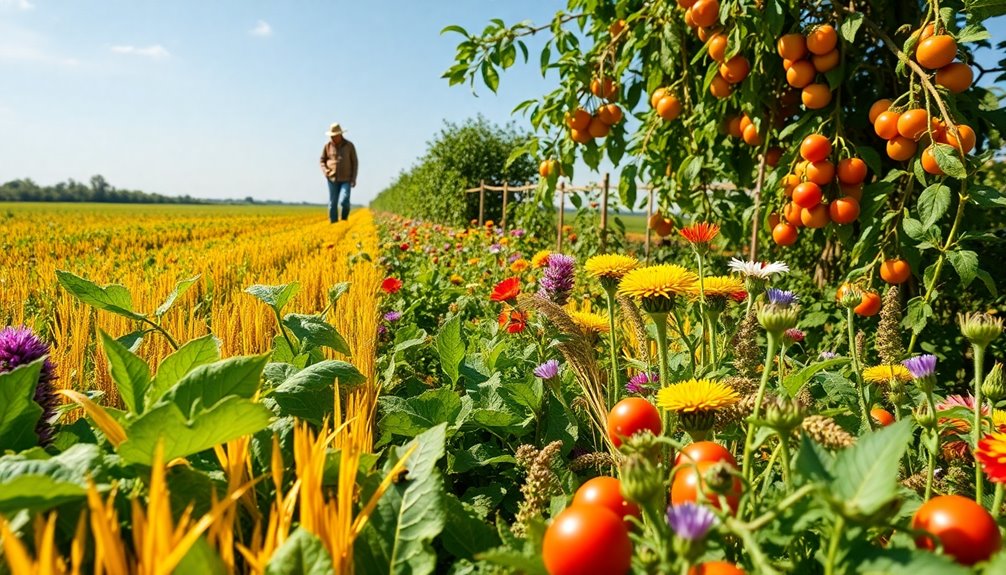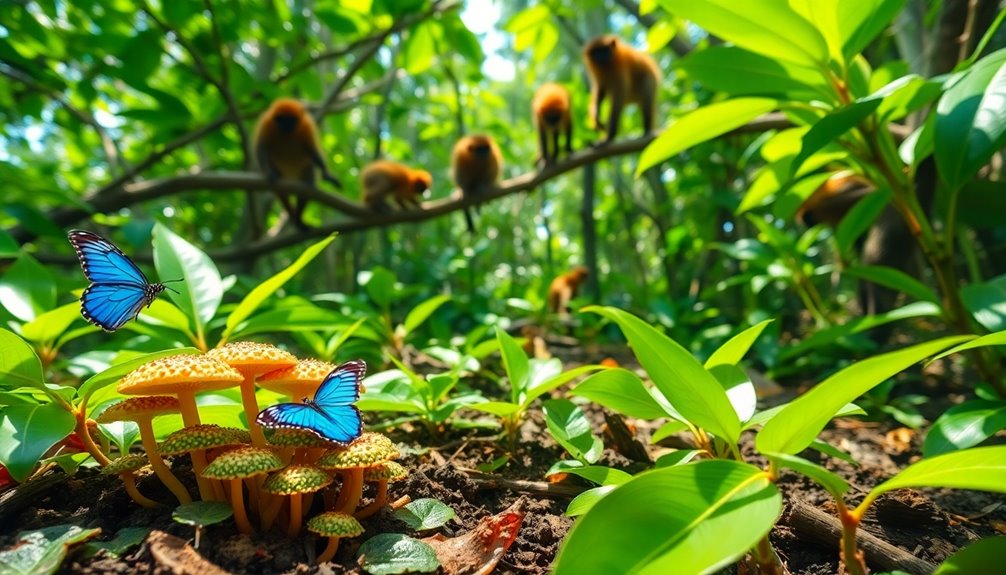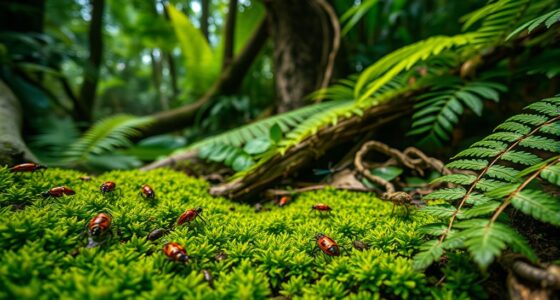Biodiversity's importance can't be overstated. It protects against climate change by storing carbon and enhancing ecosystem resilience. It guarantees food security, as one-third of global crops rely on pollinators. It fights disease, with diverse ecosystems reducing pathogen spread. Communities thrive on biodiversity, relying on healthy environments for their livelihoods and cultural identity. Economically, it generates significant benefits, as ecosystems contribute trillions to the global economy. Discover how these aspects interconnect for our planet's wellbeing.
Key Takeaways
- Biodiversity enhances ecosystem resilience, protecting against climate change and extreme weather events through effective carbon storage and ecological balance.
- A diverse range of species supports food security by providing essential pollination, pest resilience, and sustainable farming practices.
- Healthy ecosystems help combat diseases by limiting pathogen spread and offering valuable medicinal resources from nature.
- Biodiversity sustains livelihoods for billions, particularly indigenous communities, and contributes to cultural preservation and community identity.
- Economic benefits arise from biodiversity, with restoration efforts yielding significant returns and supporting industries like ecotourism and sustainable resource management.
Biodiversity Protects Against Climate Change

As climate change continues to threaten our planet, protecting biodiversity becomes essential for mitigating its impacts.
Healthy ecosystems, like forests and wetlands, store carbon and
Biodiversity Ensures Food Security

Healthy ecosystems not only combat climate change but also play an essential role in ensuring food security.
Biodiversity underpins agricultural productivity and provides indispensable ecosystem services that help sustain our food systems.
Here are key aspects of how biodiversity supports food security:
- Pollination: One-third of global food production relies on insect pollination.
- Genetic Diversity: Wild relatives of crops offer resilience against pests and diseases.
- Sustainable Agriculture: Diverse ecosystems promote sustainable farming practices.
- Protein Intake: Wild-caught fish are crucial for daily protein for millions.
- Economic Importance: Biodiversity supports agricultural products valued at around $235 billion.
Biodiversity Fights Disease

Biodiversity plays an essential role in combating diseases, especially as declining ecosystems heighten the risk of zoonotic infections.
With 70% of emerging infectious diseases originating from animals, human encroachment into wildlife habitats facilitates pathogen spread. Protected natural areas and rich biodiversity correlate with lower instances of infectious diseases, showcasing the health benefits of diverse ecosystems.
By preserving these habitats, you help buffer against disease outbreaks; more diverse populations foster stronger ecological interactions that limit pathogens' spread.
Additionally, biodiversity is crucial for developing new medicines, as around 25% of modern drugs come from rainforest plants. Losing species means losing potential medical breakthroughs, emphasizing the significant connection between biodiversity and our health.
Biodiversity Supports Communities

The connection between vibrant ecosystems and community well-being is undeniable. Biodiversity supports communities by providing essential resources that sustain livelihoods, especially in the Global South. High-biodiversity ecosystems deliver food, fuel, and medicine, making them important for economic stability.
Here are some key points highlighting this connection:
- Over 1.6 billion people depend on forests for their livelihoods.
- Indigenous people play a significant role in protecting natural landscapes.
- Conservation efforts enhance resilience and sustainability in struggling communities.
- Healthy ecosystems contribute to cultural preservation and community identity.
- Biodiversity loss disproportionately impacts vulnerable populations, increasing the need for action.
Biodiversity Yields Economic Benefits

While many may overlook the economic value of natural ecosystems, they play a crucial role in sustaining global economies. Biodiversity loss threatens industries like commercial forestry and ecotourism, potentially costing up to $340 billion annually.
Ecosystems provide essential services that support global food systems and contribute to over half of the world's GDP, estimated at $44 trillion. Every dollar spent on restoring these ecosystems yields at least $9 in economic benefits, showcasing the financial advantages of conservation.
The U.S. restoration economy is valued at $25 billion, employing more people than traditional sectors like coal and logging. By 2030, sustainable management of natural resources could reveal $4.5 trillion in new business opportunities, emphasizing the economic potential of biodiversity conservation.
Frequently Asked Questions
What Are 5 Reasons Why Biodiversity Is Important?
Biodiversity's importance can't be overstated.
First, it guarantees food security by providing a variety of crops and pollinators.
Second, it boosts human health, lowering disease risks.
Third, diverse ecosystems offer crucial services like clean air and water.
Fourth, it supports economic stability, as many industries rely on biological resources.
Finally, biodiversity enriches community livelihoods, supplying essential resources like food and medicine, especially in developing areas.
Embracing biodiversity benefits everyone.
What Are the 5 Main Causes of Biodiversity?
Biodiversity loss is like a house of cards; once one card falls, the whole structure can collapse.
You'll find the five main causes are habitat destruction, climate change, pollution, invasive species, and overexploitation of resources.
Urbanization and deforestation tear apart habitats, while climate change shifts species' homes.
Pollution degrades ecosystems, invasive species outcompete natives, and overexploitation threatens countless species.
Each cause weakens the delicate balance that sustains life on Earth.
What Are 5 Impacts on Biodiversity?
Biodiversity impacts you in several crucial ways.
First, it supports ecosystem services, ensuring clean air and water for your health.
Second, it maintains soil fertility, essential for growing your food.
Third, diverse species contribute to pollination, affecting your crop yields.
Fourth, biodiversity can buffer against diseases, reducing your risk of infections.
Finally, it enhances resilience, helping ecosystems adapt to changes, which ultimately benefits your environment and quality of life.
What Is 5 Biodiversity?
When you think about biodiversity, you're considering the variety of life forms on Earth, including species, ecosystems, and genetic differences.
There're over 8 million species, many still undiscovered. High biodiversity boosts ecosystem health, which means better productivity and resilience.
It supports essential functions like pollination and climate regulation. You also benefit from it directly, as diverse ecosystems contribute to food security and the economy, ensuring a stable environment for future generations.
Conclusion
In summary, biodiversity isn't just a nice-to-have; it's essential for our survival. Did you know that 75% of the world's food crops rely on animal pollinators? By protecting diverse ecosystems, you're helping guarantee food security and resilience against climate change. Each small action you take contributes to a healthier planet, stronger communities, and a more sustainable economy. Let's commit to preserving biodiversity, because a thriving Earth benefits us all.









